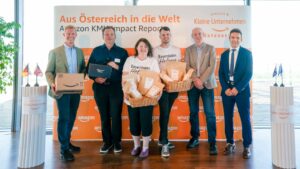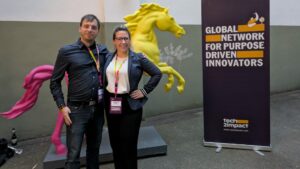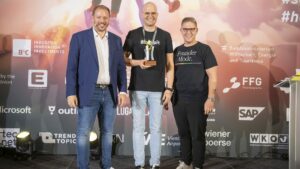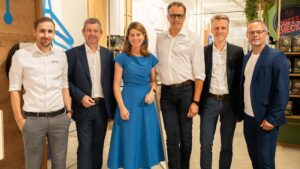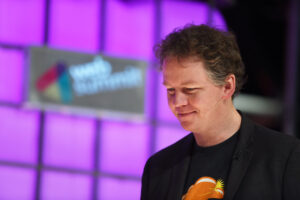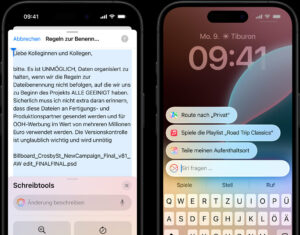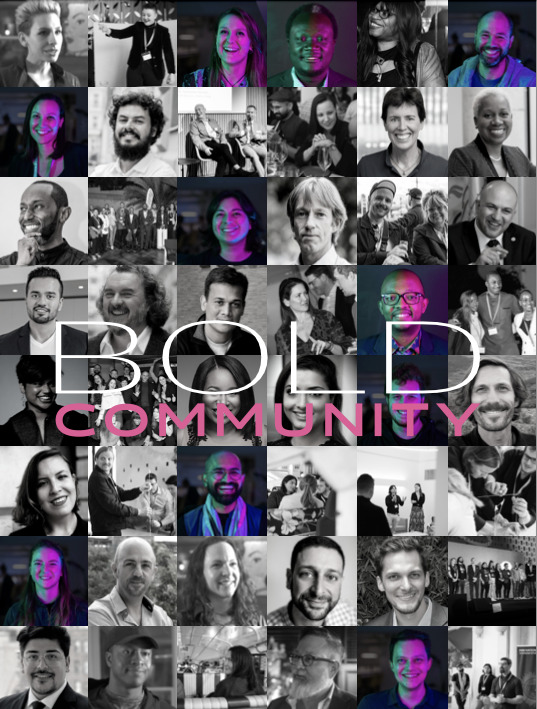WeAreDevelopers Live Week: Alle Talks und Panels im Stream
Von Montag bis Freitag findet diese Woche die WeAreDevelopers Live Week statt – und zwar komplett virtuell. Nachdem der WAD World Congress in Berlin dieses Jahr wegen der Corona-Krise abgesagt werden musste, hat sich das Wiener Gründer-Team dafür entschieden, auf dem virtuellen Weg die spannendsten Sprecher auf die Displays der Community zu bringen. Als Medienpartner gibt es die Streams zu den Talks und Panels auch bei Trending Topics zu sehen. Das Programm startet um 12 Uhr am Montag und läuft bis Freitag 17:30 Uhr.
Wer mit den Sprechern und den anderen Zusehern in Q&As und Umfragen interagieren will, kann das übrigens via Slido tun. Wir haben das Tool hier für euch eingebettet:
Das Programm
Monday, May 25 – 12:00 pm (CEST)
Welcome to WeAreDevelopers Live Week!
Let’s get started! Live Week is a virtual event loaded with educational and inspirational talks, delivered with a side of workshops and gathering some of the most prominent names in the dev world to speak their minds about trends, technologies and challenges of tomorrow in software development.
Speaker: Vilyana Lazarova, WeAreDevelopers (Moderator)
Monday, May 25 – 12:15 pm (CEST)
Web is the new native!
This is the year that we start to really bet fully on the web. There is a new web API every other month and browser vendors now see implementing browser API features not just as a way of keeping up to date, but also as a competitive space for getting more users to adopt their browsers. It seems every native feature out there is getting a corresponding Web feature being implemented. This talk focuses on the very simple yet somewhat challenging things that when it comes to implementing specific features on the web. Some of the features include taking pictures with camera devices, accessing video streams Instagram style, accessing user geolocation Uber-style, offline support for PWA applications and loads of other features. The question this talk aims to answer is can you build apps with really native features with just web technologies today?
Speaker: Sani Yusuf, Founder of Haibrid
Monday, May 25 – 1:30 pm (CEST)
Diversity in Development: Which hurdles can we overcome right now to open up development?
While IT-companies worldwide eagerly try to recruit and even educate new talent, in Austria alone more than 10.000 people are effectively barred from entering IT. They, and millions more worldwide, have little to no access to classical avenues of higher learning or job training. With the „Diversity in Development“ project, we show not only that deaf people can be included into IT, but that they belong there.
Speaker: Christoph Pirringer, Founder & CEO of CodeFactory
Monday, May 25 – 3:30 pm (CEST)
A technical introduction to Bitcoin’s 2nd layer: The lightning network
The Lightning Network is a 2nd layer technology built over Bitcoin. In this technical introduction, Andreas explains the fundamental building blocks of the network: multi-signature, payment channels, hash time-locked contracts, and routing.
Speaker: Andreas M. Antonopoulos, Bitcoin & Open Blockchain expert
Monday, May 25 – 4:45 pm (CEST)
Practice makes perfect – when it comes to RxJS
By making a deep dive into a very advanced real-world example, one will experience the strengths of RxJS. Additionally, it will help everyone to establish a reactive mindset, which is definitely the most crucial skill needed for being efficient with RxJS. Together we are going to develop a fully-featured carousel implementation, heavily relying on RxJS. By attending this experience one will boost his knowledge about RxJS and especially establishing a reactive mindset leading to scalable and resilient software design. Paired with lots of live coding attendees will learn how to approach complex scenarios and how to solve them reactively.
Speaker: Jan-Niklas Wortmann, self-employed Frontend Consultant
Monday, May 25 – 6:00 pm (CEST)
Ranking Amazon reviews by quality with pointwise ratings learned from pairwise data
In this session, Tanmay shows how you can use TensorFlow to train a neural network to rank Amazon reviews by their „helpfulness“ or „quality“ automatically. Instead of training the networks on a regression problem, where we try to predict the helpfulness score directly, we will implicitly learn this score by learning to „choose“ the more helpful review with an architecture inspired by IBM Research’s Project Debater.
Speaker: Tanmay Bakshi, Author & AI/ML Architect
Tuesday, May 26 – 11:00 am (CEST)
How to think about AI and the “New Normal”?
In these days, we are confronted with a “New Normal”: Things are slowly going back to normal, yet everyday life is still different from the pre-COVID era. While Europe is slowly awakening from an artificial deep sleep, it is certainly well equipped to find viable solutions for the future – even during these uncertain times. In this session, Dr.-Ing. Isabell Franck (Founder of franck.AI, member of Women in AI and Ms. AI) and Nancy Nemes (Ms. AI & #humanAIze) will present real-life examples of applied AI. Learn about the current AI-based technologies we have in Europe and how German companies are utilizing them in order to provide new solutions.
Participants: Nancy Nemes, Founder & CEO of #humanAIze & Ms. AI, Managing Director at Nemes Ventures; Dr. Isabell Franck, Founder, CEO & Data Scientist of franck.AI
Tuesday, May 26 – 12:15 pm(CEST)
To what extent can mobile apps solve the COVID-19 crisis?
Austria is one of the first countries to launch a mobile app aiming to contain the spread of COVID-19. We will speak to the driving forces and relevant stakeholders behind this initiative to find out more about the challenges associated with the „Corona App“.
Participants: Dr. Antonella Mei-Pochtler, Head of ThinkAustria; Michael Zettel, Country Managing Director at Accenture Austria; Thomas Arnoldner, CEO at A1 Telekom Austria; Benjamin Ruschin, WeAreDevelopers (Moderator)
Tuesday, May 26 – 2:45 pm (CEST)
Sustainable Angular Architectures with Nx and Strategic Design
Monorepos allow huge enterprise applications to be subdivided into small and maintainable libraries. This is, however, only one side of the coin: We need to first define criteria for slicing our application into individual parts and we must establish rules for communication between them. This session looks at a solution provided by Strategic Domain-Driven Design. Using an Angular-based case study, we investigate the idea of sub-domains and context mapping. Building on this, you will learn how to implement these ideas for Angular using Nx monorepos. We also discuss approaches for reducing coupling between the specific parts of our monorepo and for enforcing your architecture. By the end, you will have a technical solution and appropriate methodology to build sustainable Angular solutions.
Speaker: Manfred Steyer, Trainer & Consultant focussing Angular
Tuesday, May 26 – 4:00 pm (CEST)
Navigating Austrian startups through the crisis
In Austria we are privileged to have two organisations, spearheaded by highly competent managers, who are actively managing the distribution of grants, funding and acceleration to startups with a global potential. The current crisis makes these organisations more important than ever before, since their support is required right now. Join in for a talk with the CEOs of the Austrian Research Promotion Agency (FFG) and Austria Wirtschaftsservice (AWS) on how they are supporting startups in these difficult times.
Participants: Dr. Henrietta Egerth, Managing Director at Austrian Research Promotion Agency (FFG); Bernhard Sagmeister, Managing Director at aws; Benjamin Ruschin, WeAreDevelopers (Moderator)
Tuesday, May 26 – 5:15 pm (CEST)
State management in a world of hooks
We are at the intersection of two paths. One is about the evolution of how we share code between React components, and the second is about how we share data between them. In this talk, we explore how we can leverage the power of hooks in global state management, what are the benefits and drawbacks to using Context API, and what alternatives do we have.
Speaker: Adam Klein, Co-founder of 500Tech
Tuesday, May 26 – 6:30 pm (CEST)
The pitfalls of Deep Learning – when Neural Networks are not the solution
Nowadays, we can hear about a new deep learning model nearly every month. These models show excellent performance in their respective tasks. It may seem that with deep learning, we can tackle any problem and achieve great results. However, just like any other tool, deep learning has its shortcomings. The goal of this talk is to look into cases where deep learning excel and where it fails. We also want to outline all necessary prerequisites for the successful integration of deep learning solutions in your business.
Speaker: Adrian Spataru, Data Scientist; Bohdan Andrusyak, Data Scientist
Wednesday, May 27 – 12:30 pm (CEST)
How will we live and work after COVID-19?
The COVID-19 crisis is disrupting the world we live and work in. How will this crisis affect our society, our behaviors, the way we engage and communicate with one another? How will COVID-19 affect and the way we live and work in the long run? What can we expect to be different after the crisis is over?
Participants: Heike Mensi-Klarbach, Head of Group Human Resources at Raiffeisen Bank International (RBI); Dr. Judit Havasi, CEO at DONAU Versicherung AG Vienna; Christine Catasta, Chairman & Senior Partner at PwC; Martin Wezowski, Chief Designer & Futurist at SAP; Oliver Blüher, Country Manager DACH at Slack
Wednesday, May 27, 2:00 pm (CEST)
Can technology solve climate change?
Technological innovation has brought us from caves to skyscrapers. Can it also help us make society sustainable? Learn, quantitatively, what it takes to stop climate change and how we could get there realistically. 73 % of global CO2 emissions originate from energy (fuel, electricity, heating, etc.). Is 100% renewables possible? How? What else will it take?
Speaker: Eric Steinberger, CEO at Climate Science & AI Researcher
Wednesday, May 27 – 3:15 pm (CEST)
Evolving from pancake to spatial computing: Creating a VR/AR ready developer mindset
Before you break the rules you have to master them. But in the Spatial Computing domain they have not been established yet. Get insight on our journey of discovering rules and breaking existing boundaries of developer standards. VR/AR is not just wearing a screen on your face, it redefines the way 3D experiences are made.
Speaker: Roger Kung, CEO & Founder of Holonautic; Dennys Kuhnert, COO & Founder of Holonautic
Wednesday, May 27 – 4:00 pm (CEST)
Kotlin Multiplatform – true power of native code reuse
Petar was a part of the Five RnD team for Kotlin Multiplatform, and they were able to create an Multiplatform architecture which lets developers focus on the important part of the app – business logic), but takes care of the threading, lifecycle and other everyday nuances. Later on, the architecture was battle-tested on a real world project for a client and it proved itself by elegantly solving all of the challenges, speeding up the development while giving us an option to reuse code on multiple platforms. This talk will cover everything from the initial idea to the production ready architecture.
Speaker: Petar Marijanović, Senior Android developer at Five
Wednesday, May 27 – 5:15 pm (CEST)
The Quake Postmortem
With the release of DOOM and DOOM II, id software were masters of mayhem, riding high and unstoppable. They would soon begin work on Quake, an ambitious truly 3D FPS that would seek, once again, to redefine the state of the art. Released in 1996, Quake introduced the world to 3D mouse look, 60fps 3D texture-mapped rendering with lighting, and internet multiplayer with a client/server architecture. With its release came the birth of eSports as clans and competitions sprung up worldwide. Over twenty years later, it is still acknowledged as one of gaming’s masterworks. In this talk, id co-founder and Quake designer John Romero takes the audience through the rollercoaster that was Quake’s creation and reveals why it brought about the end of the Original id.
Speaker: John Romero, President at Romero Games Ltd.
Wednesday, May 27 – 6:30 pm (CEST)
Hidden histories of women in code
The history of women in computing has largely been lost, like the histories of factory workers who built the first cars. Yet, women invented programming, were the original developers for the ENIAC, created assembly language and developed the first compiler (not to mention the term „compiler“ and „bug“), and were instrumental to the development of many seminal programming languages. So what happened? It’s a drama that’s equal parts cultural excavation and celebration. In this talk, Brenda Romero digs up this fascinating history, explores what happened, and looks at how the artefacts of this legacy still affect computing and its growth today.
Speaker: Brenda Romero, Game Designer at Wizardry, Train, D&D, Def Jam
Thursday, May 28 – 11:00 am (CEST)
Terraform for developers
Terraform is an amazing toolset for automating infrastructure in the public and private cloud. This session will teach you the fundamentals of Terraform to deploy infrastructure in a consistent, repeatable manner across multiple services.
Speaker: Devlin Duldulao, Microsoft MVP & Senior Consultant at Inmeta
Thursday, May 28 – 12:15 pm (CEST)
An Information System Engineer’s life cycle or „Where do you see yourself in 5 years?
Back in 2012, I took my first master’s degree lecture – Information System Life Cycle – which my professor opened with the question: Where do you see yourself in 5 years? That day during the lecture I answered the question with „I want to lead my own team!“ – but was scolded to be more ambitious. I cannot recall too many details from that semester, but this question stuck. Let me help you find and reach your own ambitions. Because, the easier the question, the harder it can be to honestly reflect and come to a conclusion. In this talk, I share my past journey and how the idea of this initial question has guided me throughout the years. From starting off as a developer, becoming a tech lead and recently transitioning into being a product owner, I am far from the end of my journey – and I bet you are neither.
Speaker: Björn Wendland, Full Stack Developer & Clean Code Evangelist at METRONOM
Thursday, May 28 – 1:30 pm (CEST)
Call for Code 2020 – Build solutions that fight back
In a very short period of time, COVID-19 has completely upended our collective way of life. But we can fight back – with technology. This session focuses on one of the biggest TechforGood initiatives taking place right now – Call for Code. Call for Code asks innovators to create practical, effective, and high-quality applications that can have an immediate and lasting impact on humanitarian issues. Teams of developers, data scientists, designers, business analysts, subject matter experts and more are challenged to build solutions to mitigate the impact of COVID-19 and climate change. During the session we will cover what Call for Code is all about in detail, give insights on it’s two tracks and how your participation can have a lasting impact on societies battle agains COVID-19 and climate change. This session is for everyone, who likes to make a difference and wants to mitigate the impact of COVID-19 and climate change by creating sustainable solutions using open source technology.
Speaker: Marion Nehring, IBM Developer Advocacy DACH
Thursday, May 28 – 3:00 pm (CEST)
Innovating during the crisis
Is innovation possible in times of a crisis such as the current one? How are corporates, SMEs and startups innovating in light of uncertainty, budget cuts and financial pressure? How does innovation work in times of the Coronavirus and what can we learn from all of this?
Participants: Martin Wezowski, Chief Designer & Futurist at SAP; Georg Hauer, General Manager at N26 DACH; Nicolas Bürer, Managing Director of digitalswitzerland; Klaus Fiala (Moderator)
Thursday, May 28 – 6:00 pm (CEST)
What is the outlook for Europe’s digital future?
Does Europe have a chance in the race for digitalisation versus the USA and China? Which measures are we currently working on in order to speed up our rate of digitalisation? And which role does the current crisis play in all this? We are honored to have Margarete Schramböck, the Austrian Federal Minister of Digital & Economic Affairs, Dorothee Bär, the Minister of State at the Federal Chancellery and Federal Government Commissioner for Digital Affairs (Germany) and Marc Walder, Founder of digitalswitzerland & CEO of Ringier, on our panel!
Participants. Margarete Schramböck, Federal Minister of Digital & Economic Affairs (Austria); Dorothee Bär, Minister of State to the Federal Chancellor & Government Commissioner for Digital Affairs (Germany); Marc Walder, Founder of digitalswitzerland & CEO at Ringier AG; Benjamin Ruschin, WeAreDevelopers (Moderator)
Thursday, May 28 – 7:15 pm (CEST)
How Bitcoin changes incentives
Coming soon.
Speaker: Jimmy Song, Author, Programming Bitcoin & Bitcoin Fellow at Blockchain Capital
Friday, May 29 – 12:15 pm (CEST)
Frontend performance testing in practice
Frontend performance is more important than ever. It is often very easy to “just add another external UI component”. But are you aware of the impacts that your latest npm install had? After an introduction to frontend performance KPIs, Jonas will get into practices on how you can integrate frontend performance testing into your development workflow (the focus being on how to measure and how to automate).
Speaker: Jonas Kröger, Solutions Architect at Platform.sh
Friday, May 29 – 1:30 pm (CEST)
GraphQL Mesh – Why GraphQL between services is the worst idea and the best idea at the same time!
We all heard about the benefits of using GraphQL between the client and server, but when it comes to communication between services on the backend there is still a lot of discussions about different philosophies and solutions. Should you use Federation, Stitching or not use GraphQL at all? In this talk I’m going to demonstrate each approach, show the downsides of each of them and reveal a new, radical approach that brings the best of all worlds.
Speaker: Uri Goldshtein, Founder of The Guild
Friday, May 29 – 3:00 pm (CEST)
Quantum Computing: Why we should and how we can better compute the future
Quantum Computing attracts more and more interest but I myself have been in a position of complete confusion on the topic two years ago. So, I would love to structure the available information a little bit and boil it down to two things in more detail: hardware and software. – What does it currently mean to build and use a quantum device? – Which main frameworks are there to develop algorithms and test them on simulators or real devices? New research findings and direct application examples will be definitely included, as I did not manage to address the most important question – the „Why?“ – in Vienna thoroughly. But most importantly, I look forward to an engaging Q&A and I am curious to learn form your ideas and about your perspective on quantum computing.
Speaker: Alexandra Waldherr, Student of Chemical Engineering
Friday, May 29 – 4:15 pm (CEST)
30 golden rules of Deep Learning performance
„Watching paint dry is faster than training my deep learning model.“ „If only I had ten more GPUs, I could train my model in time.“ „I want to run my model on a cheap smartphone, but it’s probably too heavy and slow.“ If this sounds like you, then you might like this talk. Exploring the landscape of training and inference, we cover a myriad of tricks that step-by-step improve the efficiency of most deep learning pipelines, reduce wasted hardware cycles, and make them cost-effective. We identify and fix inefficiencies across different parts of the pipeline, including data preparation, reading and augmentation, training, and inference. With a data-driven approach and easy-to-replicate TensorFlow examples, finely tune the knobs of your deep learning pipeline to get the best out of your hardware. And with the money you save, demand a raise!
Speaker: Anirudh Koul, Head of Artificial Intelligence & Research at Aira
Friday, May 29 – 5:30 pm (CEST)
Raise your voice!
When people think of chatbots, they often think of that little support popup on a website, not understanding what you actually mean. It shouldn’t be like that. With AI powered chatbots, it doesn’t matter how you say or spell your questions, it will understand you. There are actually many types of chatbots; bots in social media, bots in advertising and bots specialized in understanding voice. The chatbots which live in smart speakers & voice assistants and the chatbots running in phone reservation systems and contact centers! Lee Boonstra, developer advocate for Conversational AI (and author of the ultimate audio streaming to Speech APIs – guide), will guide you how to implement your own conversational AI within your web application.
Speaker: Lee Boonstra, Developer Advocate at Google/Dialogflow



